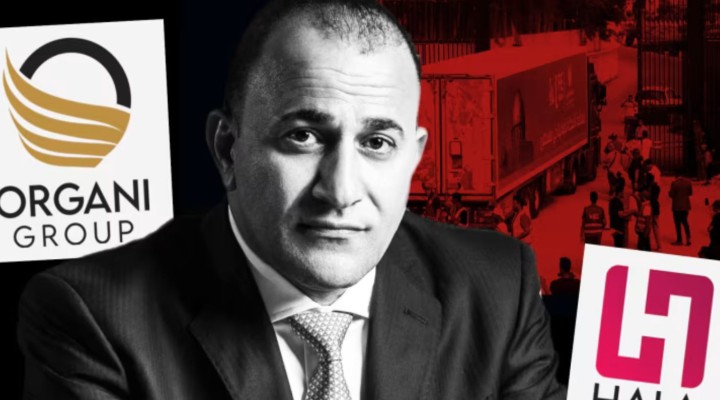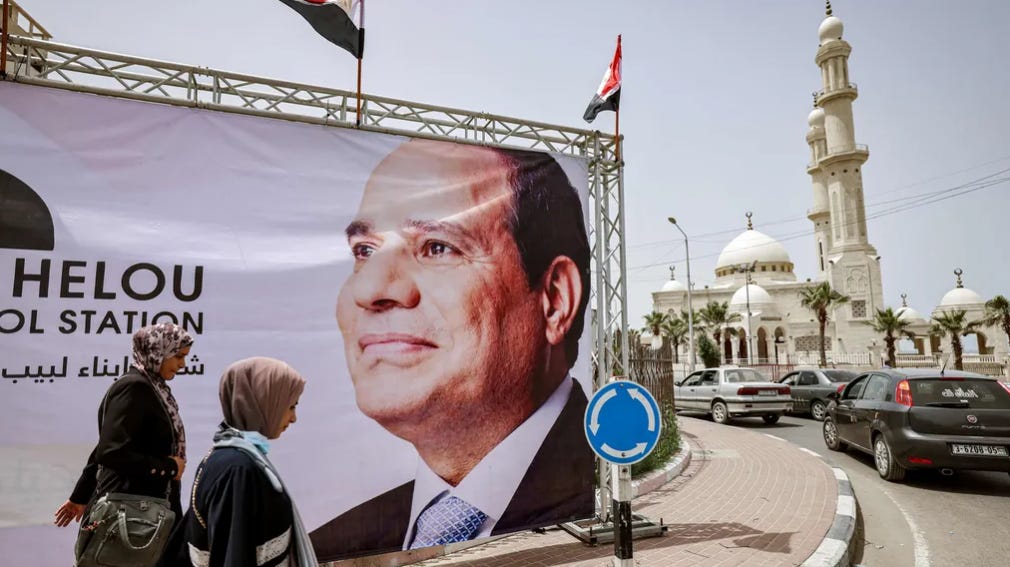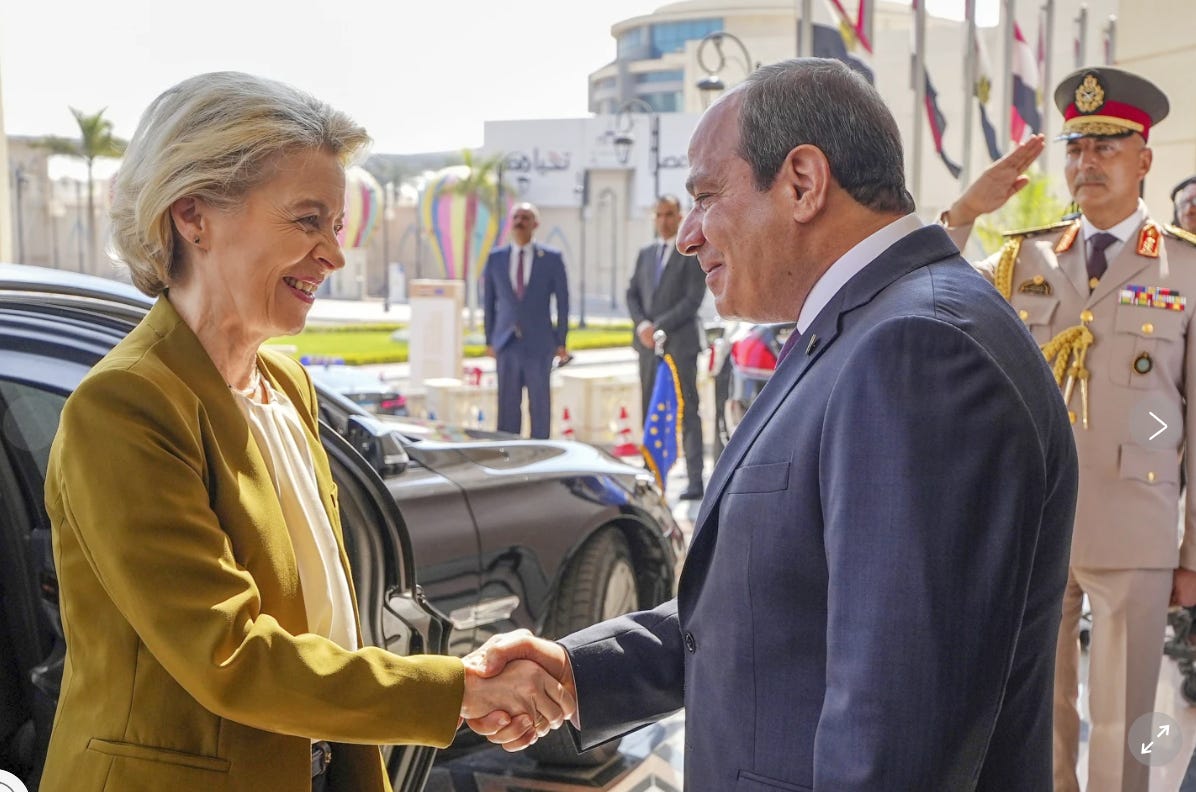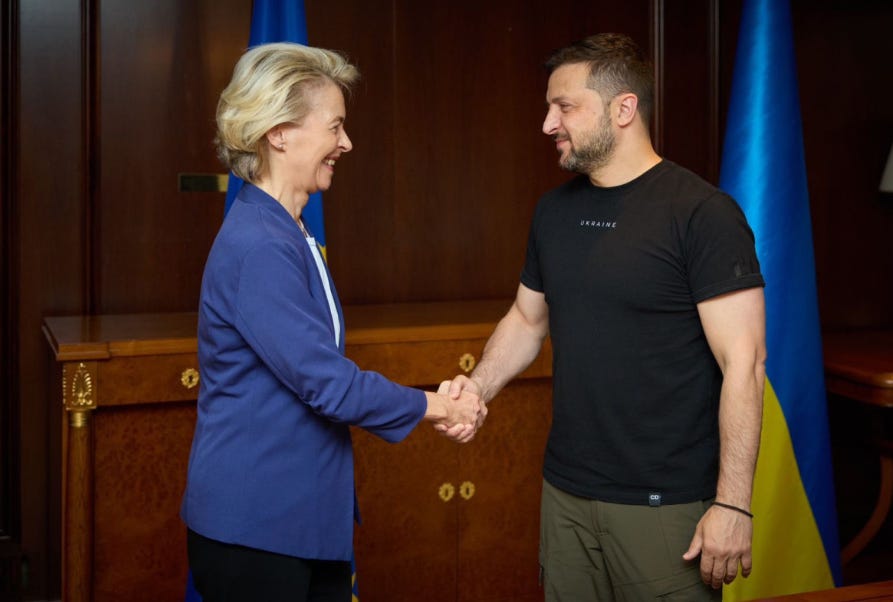The Sisi-linked cartel boss in charge of Gaza “file” – Why Egypt is not a friend of Palestine Part 3

The Sinai Mafia boss and powerbroker linked to the Sisi regime and military
Ibrahim Al Arjani rose to prominence during the alleged Egyptian war on terror in the Sinai as head of the Sinai Tribal Union. His rise was meteoric and his Empire established almost overnight as the Al Organi group that dominates construction and trade in the Sinai Peninsula. Al Arjani was a smuggler during the Mubarak era but became one of the most powerful men in Egypt under the Sisi regime. According to a 2023 article in Egypt Watch:
The man whose name was associated with the president’s son, who helps him control the General Intelligence, suddenly seemed to have an empire or, as it is called, the Al-Arjani group, which is a partner of the regime internally and externally and is considered as an ambassador of the “Decent Life” initiative, and one of the warlords who will help the Armed forces in the reconstruction of the Gaza Strip.
Timothy Kaldas, deputy director of the Tahrir Institute for Middle East Policy, said the nature of the political economy under Sisi “means almost nobody can be a big player in business without co-ordination and some kind of dependence on the regime”. Financial Times
14 years ago Al Arjani was in prison as a Bedouin tribal leader targeted in the crack down on Bedouin protests against the destruction of their environment as mentioned in Part Two of this series.
Today Al Arjani is one of Egypt’s most influential warlords with shared business interests and close ties to the son of the Egyptian president, Mahmoud Al Sisi.
Arjani, who owns some of the largest construction firms in Egypt, takes his orders from Egyptian intelligence – and also a big cut of Egypt’s aid to Gaza, and from the movement of goods from Egypt into Gaza, mostly those that pass through the Saladin checkpoint in Rafah.
Al Arjani has a de facto monopoly in the Sinai development project:
Al-Arjani is a member of the board of directors of the National Agency for the Development of the Sinai Peninsula, a public economic agency affiliated with the Egyptian Ministry of Defence, which is responsible for granting the right for Egyptians and foreigners to own or use land, as well as managing and investing in land in Sinai.
Please refer to Part One for information on the international (majority Gulf State) investment in the Sinai. The Sisi regime claims that it has spent $ 12.8 billion since Sisi took power in 2013 on the Sinai development project – headed up by Al Arjani.
The Treasure Plane scandal
In August 2023, 2 months before the Israeli genocide was launched, scandal rocked the Sisi strong-arm regime. While the majority of Egypt suffers power cuts, gas shortages, economic uncertainty and corruption a plane carrying millions of dollars, gold and weapons left Cairo and landed in Zambia where it was promptly seized by the authorities. According to a report in Middle East Monitor:
Such speculation is reinforced by reports of links between the aircraft and Sinai businessman Ibrahim Al-Arjani, who is close to Mahmoud Al-Sisi, the son of the Egyptian president. Al-Arjani is suspected of being involved in the attack on the National Security headquarters in El-Arish last month in an attempt to release detainees belonging to his Tarabin tribe. Some say that those behind the attack were paid back in Zambia.
This incident exposed the deep corruption within the Sisi regime’s close circle. Millions of dollars being smuggled during a time of severe dollar hard currency shortages in the country and while the regime was requesting yet another loan from the International Monetary Fund point to insider dealing.
The plane was reported to have carried out multiple mysterious missions over the years. There is potential that scrutiny of these missions will highlight the involvement of regional and even international partners. Political opponents have claimed that the plane is affiliated to the General Intelligence Services and to Mahmoud Al Sisi. Middle East Monitor reported:
Pictures being circulated show that the location of the aircraft often coincided with the presence of Egyptian intelligence and security delegations. These include officials from the Egyptian intelligence service accompanied by Al-Arjani in Libya, as well as Interior Minister Mahmoud Tawfiq at the head of an Egyptian security delegation participating in the 40th session of the Arab Interior Ministers’ Council in Tunisia in February.
Al Arjani’s Gaza Monopoly
Al Arjani’s monopoly extends into the Rafah border and Gaza itself. In 2021 Egypt was given the exclusive contract to rebuild Gaza after the May 2021 Zionist aggression against the besieged enclave that left thousands of Palestinians injured and killed an estimated 250 (probably a much higher number)

Post-Zionist-aggression billboards were erected along the coastal road in Gaza emblazoned with Sisi’s image. Egyptian bulldozers rolled into the enclave along with construction workers and engineers – their mission to “rebuild Gaza”. Egypt pledged $500 million to reconstruct and to build new roads inside Gaza. An article in Haaretz at the time reported:
The main beneficiary of the reconstruction plan is the company Beni Sinai, owned by Bedouin businessman Ibrahim al-Arjani, who also heads the Tarabin Bedouin tribe and the association of the tribe’s leaders in northern Sinai – which are cooperating with Egyptian intelligence in its war against the terrorist groups in the Sinai Peninsula. Arjani, who owns some of the largest construction firms in Egypt, takes his orders from Egyptian intelligence – and also a big cut of Egypt’s aid to Gaza, and from the movement of goods from Egypt into Gaza, mostly those that pass through the Saladin checkpoint in Rafah.
Egypt was awarded a monopoly over more than just the initial rebuilding efforts. With the consent of Israel, the United States and the United Arab Emirates, Qatar agreed to a new arrangement for transferring its aid: Qatar would pay Egypt for oil and gasoline that Egypt would supply to Gaza where Hamas would have control over the sale of the resources.
The pretext given by Israel for this change was that it no longer wanted Qatar-managed suitcases of cash being brought into Gaza. Israel has always claimed that Hamas has used a percentage of this cash to fortify the Resistance infrastructure and to buy weapons.
Egypt would therefore take charge of the indirect distribution of $ 30 million per month. In the past this sum was divided three ways. One part was paid out directly to poor families, another was for buying diesel fuel for the Gaza power plant, and the third was for projects to create jobs and reduce unemployment that has now topped 60 percent.
The irony is that the Sisi regime benefits from the sale of gas and oil to the Gaza strip while 1. the Egyptian people endure power outages and gas shortages 2. There are 1 trillion cubic feet of natural gas sitting 20 nautical miles off the Gaza coastline that Palestinians have never been given access to by the Zionist regime and its allies in the UK and US.
Please refer to Part Two for Sisi’s deepening ties with Israel.
The Rafah Border provides blood money for the Sisi regime
The Rafah border crossing is the only crossing allegedly not controlled by Israel. The reality is a little different, Israel controls Egyptian policy at the Rafah crossing without a doubt.
In his November 2023 CNN interview, Egyptian Health Minister Khaled Abdel Ghaffar addresses the challenging situation regarding the transfer of infants from Gaza’s Al Shifa Hospital to Egypt. Despite Egypt’s preparedness, boasting 37 hospitals and over 11,000 beds, the transfer process is stalled due to required clearances from an unspecified authority. When probed about Israel’s potential role in controlling border access, Ghaffar, while non-committal, acknowledges the influence of an external decision-maker. Israel.
A young Iranian team of journalists and researchers put together this short report on the intricacies of the 2005 Philadelphi Accords, perceived by Israel as an extension of the 1979 Camp David agreement
Al Arjani has control over trade and construction at the Rafah border. That trade extends to the millions extorted from Palestinian refugees, many children, who have fled to Egypt. An adult is charged $ 5000 and a child $ 2,500. An average family of two parents and three children will be forced to pay $ 17,500 to enter Egypt where they are given only a three month visa which does not include a work permit. After three months they are effectively illegal aliens and face expulsion back to Gaza.
Palestinians desperate to leave Gaza are paying bribes to brokers of up to $10,000 (£7,850) to help them exit the territory through Egypt, according to a Guardian investigation. [..] Belal, a US citizen from Gaza, was told he would need to raise $85,000 to get 11 family members out of the territory, including five children under three.
Before the genocide, the cost was $ 500. This is a shocking exploitation of human suffering to profit from their bloodshed by Al Arjani and the Sisi regime – while Egypt is portrayed as a peace broker and mediator, it is taking blood money from the most vulnerable Palestinians without remorse.

When Egyptian foreign minister Sameh Shoukry was asked in March whether the government condoned Hala now charging $5,000 for Palestinians to leave the Gaza Strip, he said: “Absolutely not.”
“We will take whatever measures we need so as to . . . eliminate it totally,” Shoukry told Sky News.
Yet weeks later Hala was still providing the service. Financial Times
Where next for Al Arjani and the Sisi regime?
A recent report in the Financial Times has detailed the “shuttering” of the Rafah Crossing. The Zionist military occupation of the crossing has dealt a blow to the Egyptian regime’s economic stake in Gaza, controlled by Al Arjani.
The FT reports that Al Arjani’s response to the crisis was to create the “Union of Arab Tribes” to “work side by side with the Egyptian state” on security.
In a sign of Cairo’s concerns, Organi, a leader of the Tarabin, Sinai’s largest tribe, last month announced the formation [already formed, perhaps mothballed and revived – my note] of an “Union of Arab Tribes” to “work side by side with the Egyptian state” on security.
There have been recent reports on social media that Egypt is increasing its military presence in Sinai close to the Rafah border. According to Zionist media, at least 160 armoured vehicles and 140 other vehicles have been deployed to the area. It is wishful thinking to assume that this may be a reaction to halt the genocide that Israel has been conducting since October 7th.
Instead I believe that this is linked to Al Arjani’s “security” project which is designed to PREVENT the exodus of exhausted, starved and hunted Palestinians from Gaza.
Experts viewed the move as a sign of an anxious government seeking the support of the Bedouin — once nomadic tribes that inhabit the Sinai — amid concerns that Israel’s offensive could eventually drive Palestinians into Egypt. “It is with one eye towards Rafah and long-standing fears about displacement [of Gazans],” said Michael Hanna, an expert at Crisis Group. FT
With the effective occupation of the Rafah border by Israel, with very little concrete protest by Egypt – Al Arjani will instead assume the role of policing the Egyptian side of the border with the tribal alliance.
Sabry said he saw no signs that militias were being re-established, but added that the military was likely to be “trying to organise a locally grown, broad network of spies and informants” to monitor events on the Sinai side of Gaza’s border. FT
A spokesperson for the alliance made it even clearer:
Mostafa Bakry, spokesman for the union, has said the alliance would not be armed, adding that weapons were collected from the previous tribal union three years ago.
But he told a Saudi television channel that the alliance “comes at a very important moment”.
“We are surrounded by a ring of fire,” Bakry said. “We are facing a displacement plot and the president has been very clear from the start. We will not allow displacement [of Gazans].” FT
During a televised address on Sunday 30th June, Sisi made the following statement:
The region is going through serious changes recently amid intense Israeli war in the Gaza Strip and attempts to impose forced displacement towards Egyptian territories.
The conscience of humanity was absent in this war. The international community remained silent, turning its face away from tens of thousands of innocent victims. (Emphasis added)
I don’t think I need to spell out the rank and criminal hypocrisy of such a statement in the context of this article and Part One and Two.

Von Der Leyen and President Sisi in Cairo. Body language says it all.
Meanwhile European Commission President Ursula von der Leyen announces the signing of more than 20 memorandums of understanding between European companies and Egyptian companies worth more than 40 billion euros, covering the fields of hydrogen, water, construction, chemicals, shipping, aviation, and automobiles.
Egypt is the Ukraine of West Asia.

Part 1:
Reasons why Egypt is not a friend of Palestine Part 1 – the economic trap
Part 2:
Why Egypt is not a friend of Palestine Part Two – Sisi deepens ties with Israel
https://beeley.substack.com/p/the-sisi-linked-cartel-boss-in-charge
 TheAltWorld
TheAltWorld 
2 thoughts on “The Sisi-linked cartel boss in charge of Gaza “file” – Why Egypt is not a friend of Palestine Part 3”